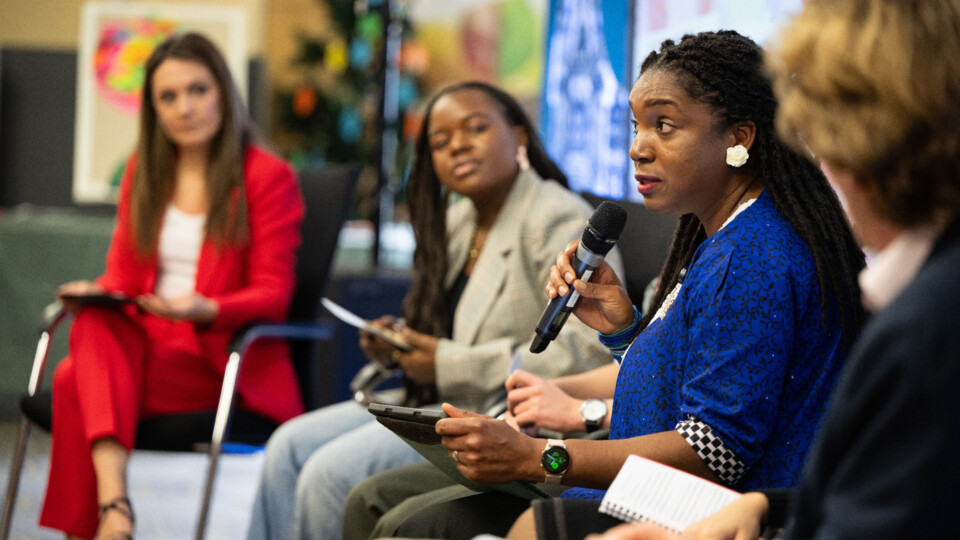Why climate change affects women more than men
TV weather presenter Laura Tobin hosted a conference to discuss why climate change adversely affects women more than men.
Climate Justice for Women was held at University of Bradford, which three years ago gained members status of COP (COP30, the largest global United Nations event for discussions and negotiations on climate change, runs until November 21).
Laura said: “We need to empower more women to make a change, they are really important.
Climate change is a really important topic and people want to know how to make a difference.”
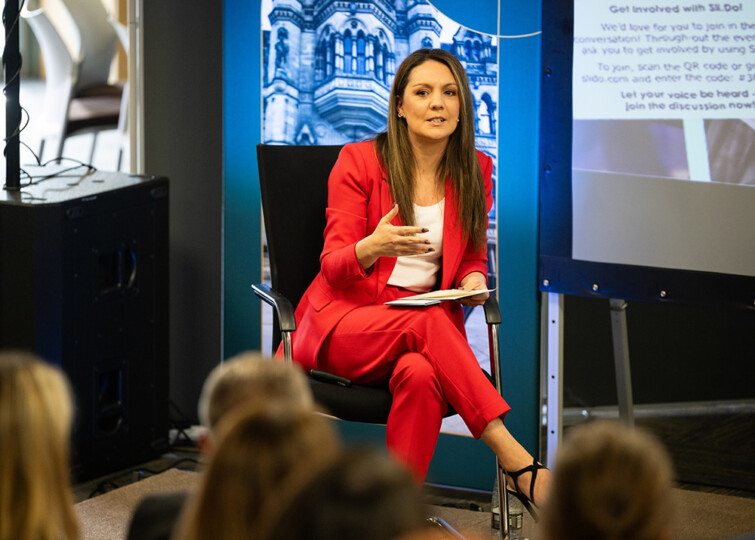
Laura Tobin, host of ‘Climate Justice for Women’. Images credit: Kiran Metha @ KM Images Ltd
The conference is based on original research by Bradford academic Dr Pedi Obani, who was awarded £1.28 million in July 2024 for a four-year project that will examine ways in which climate change adversely impacts women and will create a framework for addressing these problems.
How climate-related issues adversely affect women
• Higher exposure to climate risks: Women face greater health and lifestyle impacts from extreme weather like heatwaves
• Heavier domestic workload: Climate change increases tasks like water collection and caregiving, limiting womens time and opportunities
• Limited voice in decisions: Women are often excluded from climate policy and governance
• Worsened inequalities: Climate change deepens existing gender gaps in access to resources, education, and healthcare
• Weak legal protections: Current laws don’t fully address women’s climate vulnerabilities; reforms are needed
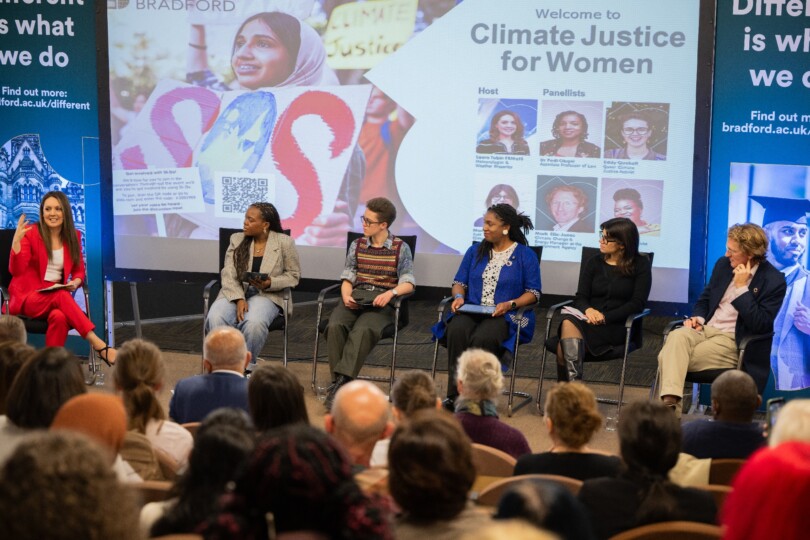
The panel of experts at ‘Climate Justice for Women’. Images credit: Kiran Metha @ KM Images Ltd
Dr Obani said: “Climate justice for women is a right and a necessity. Climate change is not just about the science but is about people’s perceptions of equity and fairness.
“Climate change is here, and it is now. It is already deeply personal for all of us.
“We are co-creating real solutions grounded in lived-in experiences. This event was an integral part of our research.
“Women at grassroots and higher levels are already leading and doing something positive on climate change. Their efforts need to be recognised, rewarded and our research is focused on strengthening regulatory frameworks to ensure just outcomes for all.”
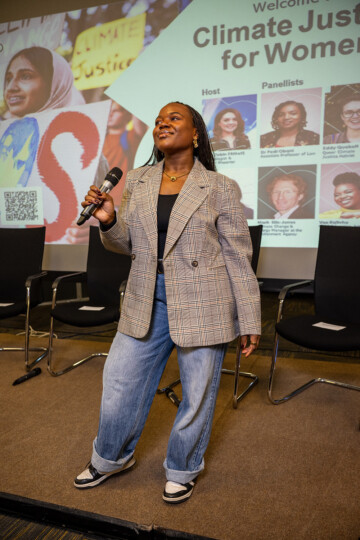
Varaidzo (Vee) Kativhu, who was one of the event’s panellists. Images credit: Kiran Metha @ KM Images Ltd
Climate justice education
Climate Justice for Women saw a panel of scientists, industry experts, academics and activists explore how women are unequally affected by climate change, as women make up less than a quarter of leadership positions in climate policymaking.
Panellist, Varaidzo (Vee) Kativhu, a British Zimbabwean education activist, author and global speaker, widely recognised for her work in education access, youth empowerment and gender equality and 2024 University of Bradford honorary graduate, said: “Embedding more climate justice education in schools is important.
“I have travelled the world and seen the effects of climate change on girls. The University of Bradford is pushing the envelope by talking about how climate change affects women.”
Climate justice activist and digital campaigner Eddy Quekett, Marta Calore, a Just Transition Analyst at the Climate Change Committee, responsible for analysing the impacts of the transition to net zero on households to advise the Government on inclusive policies, and Mark Ellis, Climate Change & Energy Manager at the Environment Agency, were the remaining panellists.
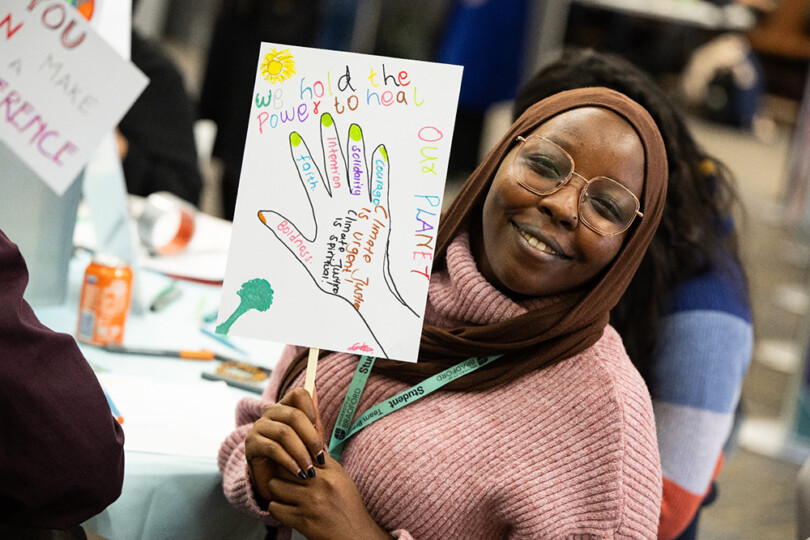
Attendees were encouraged to make placards at ‘Climate Justice for Women’. Images credit: Kiran Metha @ KM Images Ltd
What was discussed
At the event, people joined creative workshops to support climate justice research.
The panel discussed how climate change affects young people more than older generations and how laws can help make climate action fairer. The audience shared ideas such as listening to women’s voices and focusing less on profit. The event showed that although women face more challenges, they also show strong leadership in climate action.
Climate Justice for Women was part of the University’s Bradford 2025 programme, which sees research from the University come to life and celebrate the things that are important to our communities and city.
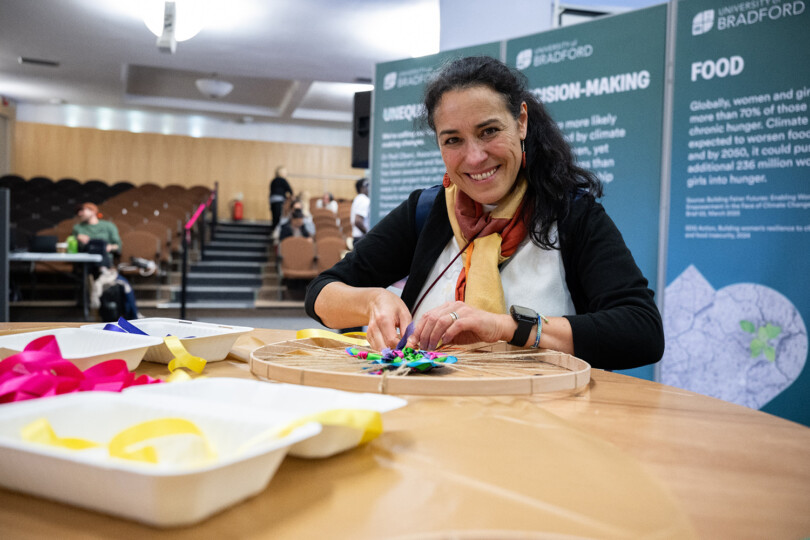
Wheel weaving was another activity at the event’s workshop. Images credit: Kiran Metha @ KM Images Ltd
Different is what we do
UNEQUAL – we’re calling out inequality and making changes
Climate Justice for Women’ and Dr Obani’s research to make sure those most affected by climate change have their voices heard are some of the ways the University of Bradford is calling out inequality and making changes. Find out more on our website

